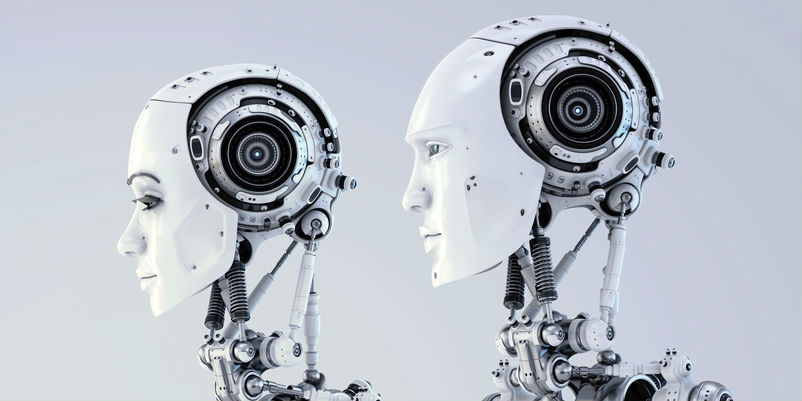Can Artificial Intelligence Grow The Economy?
How do you solve an enormous problem like stagnant global growth? It would require getting more productivity from people already working flat out. The solution? Well, it comes from something other than people, of course.

According to research published by Accenture, Artificial Intelligence (AI) has the potential to double the GDP growth rates of 12 developed economies by 2035. The study, entitled Why Artificial Intelligence is the Future of Growth, also found that AI could significantly boost labour productivity – by up to 40pc in some cases.
Between them, the 12 countries analyzed generate more than half of the world’s economic output. Accenture and Frontier Economics modeled each country’s economy in 2035 in a baseline scenario that shows expected economic growth under current assumptions. They then compared this with a growth scenario that allows for AI being absorbed into the economy over the next 18 years.
Unsurprisingly, AI would appear to yield the biggest economic benefits for the world’s largest economy, the US. The modelling suggests that its annual growth rate would leap from 2.6pc today to 4.6pc in 2035, generating an additional $8.3trn for the economy. The UK could boost its annual growth from 2.5pc to 3.9pc, generating an extra $814bn.
By 2035, Japan has the potential to more than triple its annual growth rate of gross value added (GVA), which is the value of an economy’s goods and services less production costs such as raw materials. Similarly, Finland, Sweden, the Netherlands, Germany and Austria could see their GVA growth rates double.
Artificial Intelligence has the potential to double the GDP growth rates of 12 developed economies by 2035
Undoubtedly, the world economy is in desperate need of such a stimulus. In many countries, productivity is declining because of ageing populations and shrinking workforces, while governments are failing to invest sufficiently in education, technology and infrastructure. The International Monetary Fund estimates that the world economy grew by just 3.1pc in 20161, continuing a long-term trend of sluggish growth that dates back to the 1970s2.

“AI has huge potential to boost economic growth”, says Mark Purdy, Managing Director and Chief Economist, Accenture Research. “It can have a pervasive impact on business profits because it affects nearly every part of the organisation ‒ from production, to sales, to innovation.”
The underlying principle of AI is that computer systems perform tasks that previously required human intelligence. By taking mundane, routine activities away from workers, it frees up their time so they can create, innovate and wrestle with complex challenges instead.
“In areas such as legal analysis, we now have algorithms that can analyse thousands of documents in a fraction of the time that it would take a person to do the work,” says Mr. Purdy. ‘‘This is how AI is making a difference. It is essentially a new virtual labour force and a new driver in the economy.”
Besides improving the productivity of workers, AI is driving economic growth through innovation. The analyst Gartner believes there are more than six billion digitally connected things in the world, churning out reams of data daily.3 Thanks to AI, this data can be analysed to give businesses valuable insight into their customers’ behaviour, demographics and purchasing habits.
In many countries, productivity is declining because of ageing populations and shrinking workforces
While AI is perceived as a new technology, it has been around in different forms for longer than most people realise – more than 60 years. The excitement that it is generating now reflects the fact AI has become more commercially viable thanks to the increase in the processing power of computers, a fall in the cost of storing data due to advances in cloud technology, and the existence of a wealth of digitised data.
AI is in everyday use across a range of industries. Banks are using it to automate a series of paper-based processes and insurers are applying it to detect fraud and to validate claims remotely. Mr. Purdy reports that a government agency has shown its support for AI by implementing the virtual customer-service assistant Amelia, which was developed by Accenture’s partner, IPSoft.
But while AI has the potential to transform the workplace across almost any sector, we are still some way from seeing the realisation of that potential. One big reason is that the upfront investment that AI requires can a deter organisations from investing in it, even though the ‘‘self-learning’’ nature of AI technologies means they get better and more cost-effective as time goes on. Another reason is the absence of appropriate regulatory frameworks to support the use of AI.
Finally, there are significant social, cultural and organisational barriers to widespread adoption of AI – particularly the fear that the technology will result in job losses and social unrest.
Mr. Purdy acknowledges that AI will lead people to work in different ways and in different jobs. Nevertheless, he argues that it will ultimately mean that greater importance is attached to human skills in areas such as communication, creativity, empathy and experience. “AI is very people-centred,” he says. “It’s about enabling people to do their jobs better, be more productive and focus on their high-value tasks.”